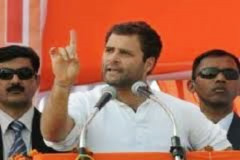
New Delhi, April 14: Post Congress's poor show in UP, recrimination has been mixed with the hunt for a stable vote bank in a state where caste remains a key arbiter of power.
While UP Congress leaders are waiting to see how the party reinvents its caste appeal, the competition and jostling among social groups like OBCs, dalits and upper castes has become the party's focal point. The lament of Brahmin leaders has been particularly loud with Congress's minority-mandal push coming a cropper.
Matters came to an interesting point during a recent review meeting when the upper caste/Brahmin argument was invoked by a local UP leader saw Congress leader Rahul Gandhi rebutting the claim by remarking "I am a Brahmin...and general secretary in the party."
The comment was read as a counter to the argument that the party had ignored its traditional, albeit alienated base, in its quest to regain salience in UP. Although upper castes have lost their dominance in the state, leaders from these sections remain vocal and pushy in their advocacy.
A week after Rahul Gandhi conducted the review of the UP election, leaders are counting on two decisive steps for moving forward - action against non-performers and a clear idea on which social group to lean on. The urgency stems from the view that there should be enough time for party message to reach the grassroots for 2014 Lok Sabha polls.
The upper caste, OBC and dalit camps in Congress are vying for the leadership's attention. According to sources, Rahul's review saw leaders speaking of the need to fashion a "base vote" like Yadavs for Samajwadi Party and dalits in case of BSP. Upper castes felt Congress could not ignore its traditional catchment group, particularly as it has switched loyalties and seems open to being wooed.
The poll defeat seems to have complicated the Congress search for a social combination to renew its appeal among voters two decades after the Babri demolition pushed it to the margins. Congress pegged the election campaign on backwards and Muslims. Dalit leaders feel Rahul's strategy to win over key social group, initiated by his visits to their huts, would pay off in the long run. That has led to suspense over the Congress leadership's new choices.
The post-poll audit brought out common refrain from all contending groups: Congress needs a base vote. But sources said it was easier said than done to come up with a target constituency.
While backwards, including MBCs voted for SP, dalits stuck to BSP which, despite the scale of its defeat, was only 3% votes behind the winner. Thakurs, a dominant upper caste, sided with SP. In contrast, Congress bid to woo the Mandal classes, with steel minister Beni Prasad Verma being projected as a mascot of sorts, did not work while the approach put off upper castes.
Sources said the brainstorming evoked sharp reactions with senior leader Ram Lal Rahi saying that focusing on Jatavs and Yadavs was a waste of time as they were not ready to leave BSP and SP. Some others felt Congress needed to keep trying. A leader quoted an election survey to argue a section of Jatavs had left BSP.
No leader opposed the Muslim gambit but most felt it failed because the 4.5% quota was brought up too close to elections and the message did not percolate down to the masses.





Comments
Add new comment